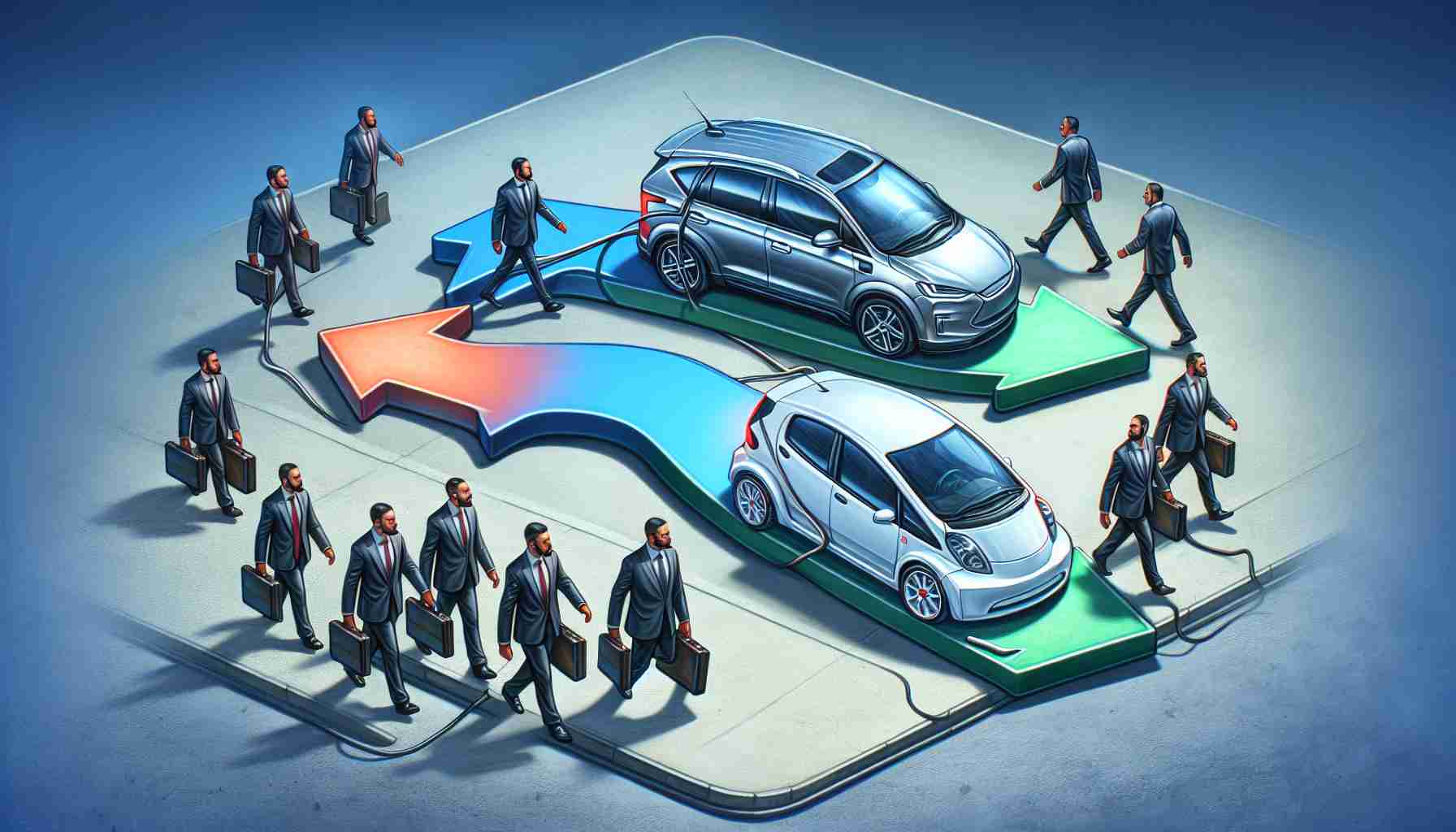The electric vehicle market is heating up! One CEO believes Tesla’s controversial political connections could lead to a shift in consumer loyalty.
In recent statements, Polestar CEO Michael Lohscheller expressed concern regarding Tesla’s leader, Elon Musk, and his politically charged comments. Lohscheller noted that potential buyers may be turned off by Musk’s alignment with extreme political movements, which could negatively impact Tesla sales. He acknowledged Musk’s achievements with Tesla but emphasized that the public perception of Musk’s views could benefit competitors like Polestar as consumers reconsider their options.
Lohscheller elaborated on the sensitivity of political affiliations in specific markets, especially in Germany, where there is particular stigma associated with right-wing endorsements. He articulated that there has been feedback from prospective buyers expressing discomfort with Musk’s statements.
As Polestar aims to carve out a niche in the EV market, Lohscheller revealed the company’s strategy to attract disillusioned Tesla consumers. Despite facing a decline in global vehicle deliveries in 2024, Polestar has seen a recent spike in interest, with a significant increase in orders during the fourth quarter.
Looking ahead, it remains to be seen if Polestar can leverage this momentum into sustained growth while challenging the dominant presence of Tesla in the electric vehicle space.
The Broader Implications of Electric Vehicle Market Dynamics
The evolving landscape of the electric vehicle (EV) market not only underscores a shift in consumer preferences but also highlights deeper societal and cultural implications. As companies like Polestar position themselves against industry giants such as Tesla, the ramifications extend beyond sales figures—affecting global economic structures and socio-political landscapes.
The intersection of politics and consumer loyalty is particularly salient. Lohscheller’s observations suggest that consumers are increasingly placing political values at the forefront of their purchasing decisions. This evolution could pave the way for niche markets to thrive as brands align their identities with the values of prospective buyers, ultimately leading to a rise in conscious consumerism. If consumers continue to shy away from brands with controversial leadership, companies may be compelled to address their corporate social responsibility in unprecedented ways, impacting everything from marketing strategies to corporate governance.
Moreover, the increased scrutiny on political affiliations could lead to African and Asian markets becoming critical battlegrounds for EV manufacturers. As major automotive players expand, these markets may react differently to political controversies, possibly opening doors for brands that champion multi-faceted representations.
Environmental consequences, too, are tied to consumer behavior. A turn away from brands perceived as politically divisive could accelerate the adoption of EVs across a broader demographic, leading to significant reductions in carbon emissions over time. Companies that capitalize on this shift may drive innovation in manufacturing and sustainability practices, ensuring their relevance in a rapidly changing world.
Ultimately, the long-term significance of these dynamics may redefine not only the automotive industry but also the intersection of politics and business in the global economy. As consumers grow more discerning in their choices, the landscape of the automotive sector could shift dramatically, fundamentally reshaping market forces and environmental outcomes for generations to come.
Can Polestar Capitalize on Tesla’s Controversies? Exploring the Future of the Electric Vehicle Market
The electric vehicle (EV) market is undergoing a transformative phase, marked by evolving consumer preferences and shifting brand loyalties. Recent comments by Polestar CEO Michael Lohscheller have highlighted the intricate relationship between political affiliations and consumer decisions in this dynamic landscape. This article delves into the current trends, features, and market strategies differentiating Tesla and Polestar, offering insights into the future of electric vehicles.
Trends in Electric Vehicle Consumer Behavior
1. Increased Awareness of Brand Influence
Consumers are becoming increasingly aware that a brand’s values and leadership can impact their purchasing decisions. Lohscheller’s comments reflect a broader trend where political affiliations of company leaders can sway public perception. This insight is particularly relevant in markets with strong political sentiments, such as Germany, where negative associations can significantly affect brand loyalty.
2. Shifts in Market Dynamics
As consumers reassess their choices, brands like Polestar are positioning themselves to capture those who may feel alienated by Tesla’s current narrative. The influx of orders noted by Polestar in the fourth quarter suggests a readiness among consumers to explore alternatives, highlighting potential shifts in market dynamics.
Features and Innovations from Polestar
Polestar has been making strides to enhance its vehicles’ appeal, focusing on environmentally sustainable practices and cutting-edge technology. Here are the standout features:
– Sustainability: Polestar aims to create a carbon-neutral car by 2030, leveraging sustainable materials and manufacturing processes. This commitment resonates with environmentally conscious consumers looking for ethical brands.
– Performance Engineering: The company continuously innovates its vehicle performance, combining electric power with high performance, which appeals to driving enthusiasts.
– Technological Integration: Polestar vehicles come equipped with advanced infotainment systems, including features like Google Assistant, which enhances the driving experience.
Pros and Cons of Choosing Polestar over Tesla
Pros:
– Sustainability focus: Strong commitment to environmentally-friendly practices.
– Innovative technology: Enhanced user experience with advanced infotainment.
– Emerging market presence: Opportunity to attract disillusioned Tesla customers.
Cons:
– Limited brand recognition: Polestar is less known than Tesla, which may affect initial consumer trust.
– Production capacity: Scaling production to meet increasing demand can be a challenge.
– Market competition: The EV market is becoming saturated with new entrants.
The Competitive Landscape
The EV market is vibrant, with several competitors challenging Tesla’s foothold. Brands like Ford with its Mustang Mach-E and Rivian with its R1T are also carving out their spaces. Polestar’s unique selling proposition is its dual focus on performance and sustainability, appealing to a niche yet growing segment of eco-conscious consumers.
Insights into Pricing and Specifications
Polestar’s vehicles generally fall within a competitive price range, starting from approximately $45,000 for the Polestar 2. With various specifications targeting different consumer needs—including range, performance, and luxury features—Polestar is well-positioned to attract a diverse clientele.
Looking Ahead: Predictions for the EV Market
Market analysts predict that as public sentiment continues to evolve, brands that navigate political waters carefully will gain consumer trust and loyalty. Polestar’s current momentum, particularly amongst those reconsidering their allegiance to Tesla, could signal a significant shift in EV market dynamics.
Conclusion
As the electric vehicle industry heats up, consumers are likely to gravitate towards brands that align with their values and beliefs. Polestar’s strategy to attract discontented Tesla customers may not only provide the company with a competitive edge but also reshape how political discourse impacts consumer behavior in the EV market.
For more information about the ongoing evolution in the electric vehicle industry, visit Polestar.













